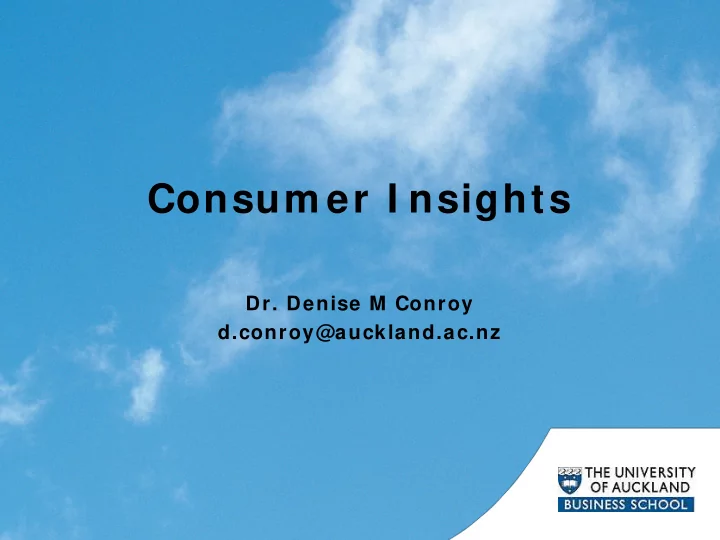

Consum er I nsights Dr. Denise M Conroy d.conroy@auckland.ac.nz
W ho am I ? • I ’m a hybrid – MSc (Hons) Psychology – PhD Management – Snr Lecturer Marketing (was Quant now Qual ) Business Background : Advertising and Public Relations Translating technology for consumers Academ ic I nterests : Sustainability, identity and Lifestyle in the FOOD space (social marketing and policy) working across disciplines taking a consumer-centric approach - Landcare; Plant and Food; HVN; Population Health
W hat is Consum er Behaviour? Three Characteristics: 1. How consumers differentiate between products 2. Why they buy & consume 3. How they think & act when buying FUNCTI ONAL – HEDONI C - STATUS
W hy is Consum er Behaviour I m portant? Understand Variables affecting Purchase Predict Purchase Design Strategies based on Controllable Variables Achieve Objectives I n order to m arket effectively, it is crucial to understand OUR consum ers
Consum ers are dem anding m ore control over their w orld • We live in an age of knowledge and social connection • We live in an age of fear and mistrust • We live in an age of wealth and plenty
My areas of interest: • High Value Nutrition National Science Challenge – Focussing research towards the health needs of consumers in key export countries – Taking a consumer-centric approach – Industry partnerships – NZ Food & Beverage industry is willing to take on the challenge of capturing the food-for-health opportunity – Metabolic Health – Gut Health – Infant Health – (cognitive, mobility, ageing, etc)
Consum er trends tow ards food production: Healthfulness • Healthfulness is a non negotiable core value that extends far beyond the concept of nutrition – Functionality – aging well, gut health, mobility etc. – Sustainability – including animal welfare, fair labour etc. – Provenance – where grown, when harvested etc. – Labelling – production, nutrition etc.
My areas of interest: • Labels – What do Consumers want from labels? • comprehensibility, meaningfulness, credibility • Not just food – Tracking technology (consumers who care) – How do consumers make sense of labels? • Concepts such as “satiety” – believability/ hope/ willingness to buy and try • What do consumers want from labels? – Not just food, but items such as furniture
Consum er trend: Know ledge Consumers are concerned that they don’t know enough about consumer goods production practices – including food – They will demand transparency – They want to partner with the industry – They want industry to educate them – not only to hear about negatives e.g. hormone usage, scandals etc. – They want more control and believe they have this power – especially in the age of social media – They want websites that honestly answer their production questions e.g. McDonald’s Canada- our food your questions site
My areas of interest • Trust and re-trust – Infant formulae in China – How do new parents decide which brand to trust? – What happens when there’s a scandal? – Do Consumers re-trust?
My areas of interest • Overweight and obesity in young adult New Zealanders – Look at those who are not, and never have been overweight or obese – what do they do? • Socialization • Cognition/ Awareness • Behaviour • Money
Understanding Consum er Behaviour - W hat’s in it for industry/ governm ent? • The building of engagement: – Consumer trust is essential to engage Consumers • Differentiation increases involvem ent – Consumer trust is essential for building long term relationships • Consum ers seek to satisfice the m ajority of the tim e – Consumer trust is essential for brand recovery • W e are m ore forgiving of those w e trust
Creating Value • Listen to Consumers and respond to their needs – consum er led innovation • Explore what you don’t know and what your Consumers may not be aware of (blue ocean) – industry/ policy led innovation • Consumers are willing and able to pay a premium to have their needs met – financial or other resource
Consum ers • Both values and value matter to Consumers – Understanding consumer values is crucial to attracting/ engaging customers – High levels of identification – where consumers consider a Brand/ Message to reflect their own values - results in trust, relationship longevity, forgiveness and advocacy – True understanding turns consumer interest into consumer commitment
d.conroy@auckland.ac.nz Thank you
Recommend
More recommend